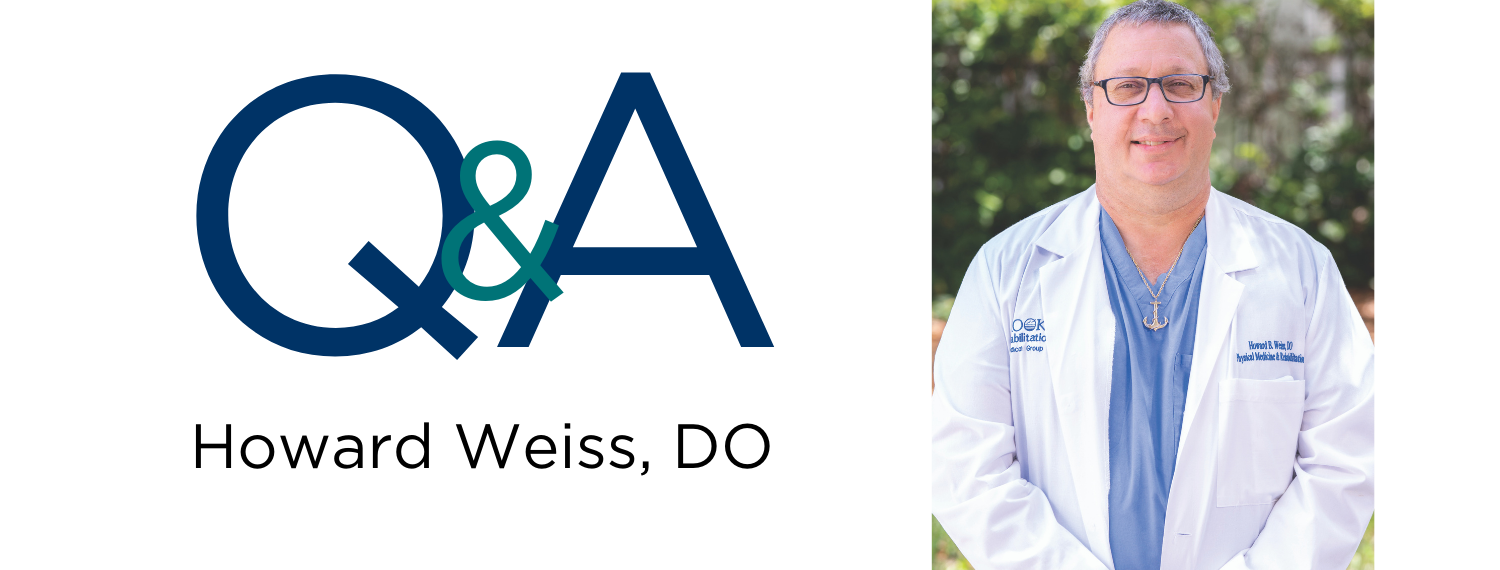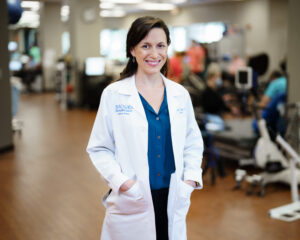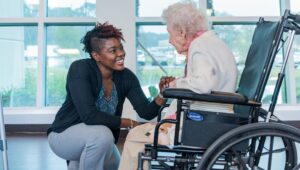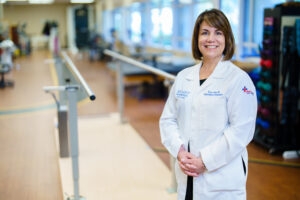Q & A with Dr. Howard Weiss

Back to physical health resource hub
Howard Weiss, DO, is the Medical Director of the Orthopedic/Trauma Program and the Medical Director of the Amputee Program at Brooks Rehabilitation. Certified in Physical Medicine & Rehabilitation (PM&R), Dr. Weiss graduated from the New York College of Osteopathic Medicine and completed his residency at Mount Sinai Hospital.
What got you interested in medicine and specifically Physical Medicine and Rehabilitation?
I realized medicine would be a career in lifelong learning. The combination of science, math, engineering and interacting with people appealed to me. My original goal was to be an orthopedic surgeon, but during my internship, my older sister Lisa, who was an occupational therapist, thought I’d like physical medicine and rehabilitation (PM&R). She encouraged me to do a rotation. That’s where I met a very special patient, Bernie.
PM&R is a great field that combines orthopedics, neurology and internal medicine. For me, it’s about the story. If you sit down and talk to the patient, you’ll learn something. If you learn their story you can help them and make a difference in their lives. The one thing I ask every new doctor when I interview them is, “Tell me the story of the last patient who inspired you.” If they can’t tell me, I don’t hire them.
What changes have you seen in rehabilitation throughout your career?
There have been tremendous advances in technology through the years. For patients with spinal cord injuries, we now have electric wheelchairs, functional electrical stimulation (FES) bikes, walking systems like Cyberdyne and ReWalk. We have Bioness technology that helps patients open and close their hands.
When I first started working with amputee patients, we used wool socks and belts to hold a prosthetic in place. Now technology comes closer and closer to simulating the limb a person lost. The materials and suspension systems have changed significantly. From silicone, pin locks and suction to hydraulics and microprocessor knees and ankles that lead to better walking and better outcomes for patients.
Advances in targeted muscle reinnervation (TMR) make it possible to reassign nerves to allow patients to control their prosthetic limbs. And I’m looking forward to treating the first patient in this area to receive a bone-anchored prosthetic through osseointegration.
All of this technology helps physiatrists, doctors specializing in PM&R, improve the quality of life for patients.
When deciding where to go for rehabilitation, what sets Brooks apart?
Brooks is open to innovation and specialized care for specific populations. Brooks has whole-heartedly supported me with the creation of our amputee program. They allow and encourage all staff to think outside of the box to help our patients.
We have a variety of highly trained experts at Brooks and we all work as a team. If one of my patients is having issues with depression, I can call in a psychologist. If a patient needs to lose weight, I’ve brought in a dietician. If they need to know how to stand and cook at the stove, I can bring in an occupational therapist. If patients don’t have the financial resources for the care they need, we have the Brooks Foundation available to help. Everyone works together with one goal – helping our patients meet their goals.
What can your patients expect from you?
100 percent effort. If they put the effort in, we double it. We help all our patients get back to their highest possible level and follow them until they get there. If they hit bumps along the way, we figure it out together.
In the end, it’s all about the story. Each story is different, and we have wins at different levels. Sometimes it’s walking, but sometimes it’s being able to have dinner with their spouse or being safe at home so they can live independently. But we help them get back to their story. I get a kick out of postcards and photos. I tell all my patients to send me pictures of them back out enjoying their life. When I get tired, it’s the photos and stories that inspire me to continue.


